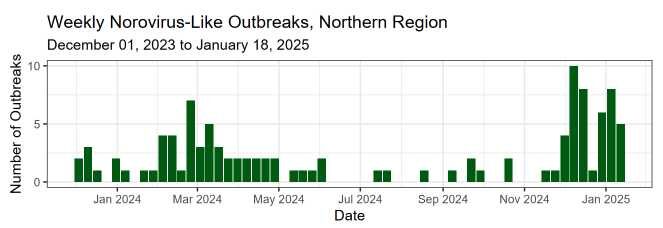The spread of a notoriously contagious stomach bug in Arlington is prompting public health experts to take extra precautions.
An alert about a surge in suspected norovirus cases was sent to Arlington Public Schools families last week, as “norovirus-like outbreaks” have increased in Northern Virginia since late 2024.
Experts encourage people to wash their hands thoroughly, watch for signs of gastrointestinal illness, and stay home for at least two to three days after symptoms disappear.
“It’s very contagious,” Dr. Jennifer Primeggia, an infectious disease and internal medicine specialist at VHC Health, told ARLnow. “Everyone wants to do the right thing and everyone wants to take care of each other, but know that you are contagious from the start of symptoms until three days after you feel better.”
Norovirus spreads easily, especially in healthcare settings, restaurants and catered events, schools and daycares, and cruise ships, according to a county fact sheet.
People usually get sick through direct contact with an infected person, eating contaminated food or drinks, or touching contaminated objects and then putting unwashed hands in their mouth.
The most common symptoms are nausea, vomiting, diarrhea and stomach pain. They generally set in 12 to 48 hours after exposure and last one to three days.
“If you had this and you’re getting better, it was probably norovirus,” Primeggia said.
The doctor warned that some people showed the virus for up to two weeks to a month after symptoms disappeared. VHC Health averaged between 18 and 20 positive norovirus tests per week in December, she said.
Although that number has declined in the new year, suspected outbreaks in Northern Virginia remain far higher than the number reported this time last year, according to data from the Virginia Department of Health.

There is no medication to treat norovirus, experts note, but people who get sick are encouraged to drink plenty of fluids to avoid dehydration. Additionally, Primeggia warned that hand sanitizer will not kill this particular virus, making it even more essential that people wash their hands regularly with soap and water.
This is especially important after going to the bathroom or changing a diaper, before preparing and eating food, and before taking or giving anyone medicine.
People should also wash fruits and vegetables thoroughly and use a bleach-based cleaner to disinfect surfaces with vomit or diarrhea.
“The best advice I can give you is if you don’t feel well, stay home and if you don’t feel better after a few days, contact your health care provider,” Primeggia said.
Below is more information from Arlington Public Health about the spread of the virus and ways to stay healthy.
1) Norovirus data/information
- Norovirus outbreaks increase during the winter months, with “norovirus season” typically lasting from November to April (VDH GI Regional External Talking Points).
- The most common symptoms of norovirus include: diarrhea, vomiting, nausea, stomach pain or cramps, and/or fever (Arlington Norovirus Fact Sheet – also available in other languages: Amharic, Arabic, Farsi, Mongolian, Spanish).
- Although individual cases of norovirus are not a reportable condition in Virginia, outbreaks are reportable (VDH GI Regional External Talking Points).
- Norovirus spreads easily in healthcare settings (including long-term care facilities and hospitals), restaurants (including catered events), schools and daycares, and cruise ships.
- Arlington has seen an increase in reports of norovirus outbreaks during this winter season.
- Emergency room and urgent care visits are regularly monitored for an increase in gastrointestinal (GI) illnesses, including norovirus, by Virginia region.
- The Northern region (which includes Arlington, as well as Alexandria, Fairfax, Loudoun and Prince William) experienced an increase in emergency room/urgent care visits and reported outbreaks linked to gastrointestinal illness over the last month (VDH Gastrointestinal (GI) Illness in Virginia, by region). This increase is similar to trends in Virginia and the United States
2) Stay healthy during norovirus season
Below are steps you can take to limit the spread of norovirus infection (Arlington Norovirus Fact Sheet – also available in other languages: Amharic, Arabic, Farsi, Mongolian, Spanish ).
- One of the best tools to avoid getting sick from norovirus is good hand washing:
- Wash all surfaces of your hands thoroughly for at least 20 seconds, with plenty of soap and water. (Note: Alcohol-based hand sanitizer does not kill norovirus. (CDC)).
- Wash your hands properly before preparing and eating food, taking or giving medicine, and touching your eyes, nose, and/or mouth.
- Wash your hands properly after using the toilet or changing a diaper.
- If you are sickstay home and away from others for at least 2 days after symptoms disappear, to avoid getting others sick.
- If you or someone in your household becomes ill:
- Immediately clean and disinfect surfaces with vomit or diarrhea.
- Use a bleach-based cleaner and follow the product instructions.
- To disinfect non-porous surfaces, you can mix 1 cup of regular strength bleach (5.25%) with a gallon of water and leave on the affected area for at least 5 minutes (VDH).
- The EPA maintains a list of products effective against norovirus.
- Wash clothes and linens soiled with vomit or diarrhea, using detergent and hot water at the maximum cycle time available, then machine dry on the highest recommended heat setting (following instructions manufacturer) (CDC).
- Do not prepare food or care for others while you are sick and for 2 to 3 days after symptoms disappear.
Photo by the National Cancer Institute on Unsplash



